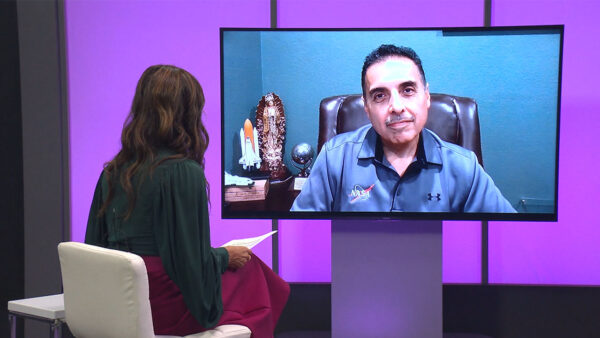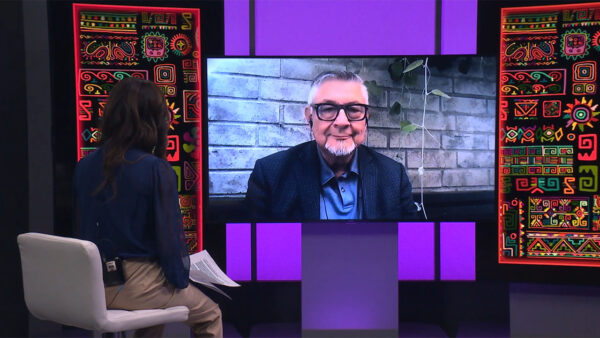Drug Enforcement Administration (DEA) Special Agent in Charge Phoenix Division Doug Coleman, talks to Horizonte host Josè Cà rdenas about what is being done to stop Mexican drug cartels and fight the war on drugs in Arizona.
José Cárdenas: The Sinaloa Cartel is the most powerful drug trafficking organization in Mexico and the largest operating in Arizona, and is currently responsible for the majority of all drugs crossing the border into Arizona. With me to talk about the Mexican cartels and more is Doug Coleman, the Drug Enforcement Administration Special Agent in charge of the Phoenix division. Doug, welcome to "Horizonte."
Doug Coleman: Thanks for having me.
José Cárdenas: On the cartels, first of all, give us a description of the Sinaloa Cartel and what they're doing in Arizona and what's going on in Mexico as they fight with the rival gangs.
Doug Coleman: The Sinaloa Cartel was the most power drug cartel in the world. They control the vast majority of the narcotics that are coming into the United States through Arizona. There continues to be a fight between the Sinaloa Cartel and other cartels for control of different ports of entry, but right now the Sinaloa Cartel is still strong, still the most significant threat to drug trafficking in the United States.
José Cárdenas: They've been hit even read periodically over the last couple years about the Mexican government, particularly the naval forces, taking out some of the leaders of the Sinaloa Cartel, and others as well. Has that had an impact? Have you seen any diminution in the level of activity?
Doug Coleman: Every time a key cartel figure is taken out a key leader, there's a void in leadership. What's ended up happening is the other cartels will make a move on those locations where that leader has been taken out, to try to gain control, and that's the main reason that you see the significant violence that you see in Mexico. It's warring between the cartels for different activity and different control of different areas.
José Cárdenas: Continue to focus on the Mexican government and the cartels, new administration made it a point during the election to deemphasize the war on drugs, on drug trafficking, rather. And it seemed like that was a positive, at least for the Mexican populous. They were tired of the killings and violence. Over the last year or so, the attitude seems to have changed, but has it been dramatic?
Doug Coleman: I think what you see is you see a new president coming in who's going to deemphasize what they call the war on drugs, and emphasize violence. The reality is that the two intertwine. While he is changing some things we still have the positive relationship with the new administration and we still have a lot of interaction with them and joint operations going on, because you cannot separate drugs and violence. They're intertwined.
José Cárdenas: There was a suggestion and concerns on the American side as I understand it that the level of cooperation with the Mexicans would go down, and the activity of American agents in Mexico would be diminished.
Doug Coleman: Like any new administration coming in, he still is deciding how exactly it is they're going to cooperate with us. The prior administration, the Calderón Administration was in government for six years so we had a firmly established relationship with them. I think we're feeling each other out between us and the new administration, but I think the positive things are happening and will continue to happen between the U.S. government, DEA and Mexican government.
José Cárdenas: Let's talk about the cartels in Arizona. What kind of activity do you see and where?
Doug Coleman: Arizona is a key transshipment point. The majority of the drugs the cartels controls use Phoenix as a stash location to be moved throughout the United States. We're a key figure in the key port in what happens because everything comes here first. And from here it's going to other places. We're the first stop for the cartels. Command and control actually deals with the leadership in Mexico, is in Arizona. So this is where they're very vulnerable for us to take them out. We're the first stop before it gets distributed throughout the United States.
José Cárdenas: What kind of drugs are we talking about?
Doug Coleman: In Arizona our major threats are marijuana, heroin, methamphetamine.
José Cárdenas: When you talk about command and control, another operations in Arizona, how many people are we talking about? What kind of force do they have here?
Doug Coleman: As I tell people all the time when they ask me that, if I knew where they were, I'd arrest all of them. We're not exactly positive. We know as soon as we identify them we go after them. So it's a significant foothold for them, but DEA, our local partners, everybody we're hammering them every day.
José Cárdenas: Has the situation improved, diminished? How would you assess where we are now as opposed to five years ago?
Doug Coleman: I think drug trafficking, I've been in this business 25 years. Drug trafficking ebbs and flows, different drugs get popular, different methods of smuggling come in, it's a continuous fight. The idea that we put on the -- a war on drugs, that puts an end game to it. There's not an end game, as long as criminals continue to violate the law, we'll always fight them. What you see is an ebb and flow. And we see that now. Different drugs become popular, we attack the way they move them, they adjust, we adjust, it's a constant battle.
José Cárdenas: Any significant changes? You've been here in Arizona for six years. Any significant changes over that six year period?
Doug Coleman: We're seeing a significant change that bothers me as a parent, as an Arizonan, there's a significant rise in the amount of heroin coming into this country. And it's through Arizona is one of the main ports directly related to an increase in prescription drug abuse by young people in the country.
José Cárdenas: And explain that. We talked a little bit about it offline. Why is that? What's the connection?
Doug Coleman: I think there's a perception among young people if a doctor prescribes something or you can get it from a drug manufacturer, that it's OK and it's not bad for you. But the reality is, prescription drugs are the same thing as street drugs, they just have a fancy bottle and a fancy name. Young people believe oxycontin, Percocet, that they're OK because doctor has written the prescription for mom and dad. The reality is, those drugs are opiate-based, the same thing as heroin. What we have is younger people getting addicted to prescription drugs, and when the prescription runs out, they're opiate addicts. The next logical step for them if they can't get the prescription is street heroin.
José Cárdenas: And the heroin is coming across the border from Mexico?
Doug Coleman: The Mexican cartels have noticed, and they're smart businessmen, they realize there's an increasing demand for heroin because of the increasing population among young addicts. So they're increasing the heroin that comes into the country. They're increasing their movement of heroin to try to meet that demand.
José Cárdenas: I've also read some of the heroin is coming -- Originating in Afghanistan and Syria as means of financing activities there.
Doug Coleman: We don't see a lot of that heroin in this part of the country, but Afghanistan heroin is a small portion that comes into the United States, but it is used to funnel drug trafficking proceeds to fund terrorist activities. Mostly in other parts of the world, Europe has a significant Asian heroin problem. We see a little bit on the East Coast, we don't see a lot of Asian heroin in Arizona.
José Cárdenas: Let's talk now about another problem that's affecting particularly young people that is the synthetic drugs. You had a major operation recently, tell us about that.
Doug Coleman: The synthetic drug problem is an emerging problem. The drug flow ebbs and flows all the time. The emergence of synthetics comes back to the same perception that young people have that we talked about with the prescription drugs. People believe that if it's sold over the counter at a store, it's OK. So we have these manufacturers who acquire these substances, and they can -- They're not specifically outlawed, so they've put them into head shops and they're selling them as bath salts or spice, K2, they're marijuana and methamphetamine mimics. So they have virtually the same effect as marijuana or methamphetamine, but they're being sold legally in a loophole in the law. Kids, again, believe this the substance OK because it's being sold and we as police are not stopping it from being sold, so they're going to get addicted to these substances. Log Jam the case you talked about, we took off --
José Cárdenas: We've got pictures as we're talking about that operation.
Doug Coleman: Log Jam was a nationwide DEA-led investigation. Here in Arizona we had 12 different locations with head shops that were selling the K2, spice, bath salt products. And as a result of that, we seized thousands of pounds of K2 and spice products, millions of dollars and put a lot of those retail businesses out of business and got some convictions behind it as well. That particular -- our section was 12 warrants throughout Arizona but it was a nationwide effort that resulted in hundreds of warrants and millions of dollars and millions of pounds of products seized.
José Cárdenas: We had a picture of one of the locations where agents raided Camelback Liquors I think. My understanding is this unlike the Mexican cartels, which are very organized in major operations, this is vast; mom and pop type of operation.
Doug Coleman: There are significant -- There are a few significant manufacturers who then sell to all of these head shops. The manufacturing is mostly done domestically. You can acquire the active ingredient, the actual drug from sources in China and India, it comes in as a very simple process to make it, and then it can be sold from these major manufacturing locations in strip malls to the head shops around town.
José Cárdenas: And we have a couple more pictures of the results basically of the raids. What are we looking at right here on the screen?
Doug Coleman: Those pictures will be small pictures of some of the samples that we took from the different locations. The K2 and spice products are sold almost like marijuana, in little small bins, and they're all manufactured and they're marketed so that young people are attracted to them. They put different flavorings on them; it's all to try to suck young people into buying these products. Those pictures are samples that we took.
José Cárdenas: Summarize briefly the results of Operation Log Jam.
Doug Coleman: Operation Log Jam, we seized several thousand pounds of K2 and spice products, which are the marijuana mimics. We seized several hundred pounds of bath salts, which is the methamphetamine mimic. We arrested about 18 people if I remember correctly, seized a couple million dollars worth of assets, and took out about 12 different locations around Phoenix that were selling these products.
José Cárdenas: One last thing I want to address are the myths about these synthetic drugs. Kids think they're harmless, they think they're legal, and they think they're not detectable by the kinds of tests that employers might do for a job application. None of that is true.
Doug Coleman: Right. They're not harmless. These are drug mimics. They have the same chemical effects the drugs they're supposedly mimics. So they're obviously not harmless. They're certainly are not legal, there was a loophole in the law that allowed them to sell these initially when we saw the abuse pattern, DEA regulated some of the substance, many states including Arizona have passed legislation to outlaw these substances. So they're no longer legal and they're certainly not a way to beat a drug test.
José Cárdenas: Doug Coleman Special Agent in charge Phoenix division DEA, thank you so much for joining us on "Horizonte" to talk about this very, very serious problem.
Doug Coleman: Thank you.
Doug Coleman:Phoenix Special Agent in Charge DEA Phoenix Division, Drug Enforcement Administration;























